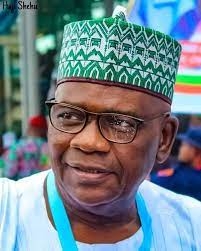
Mohammed Danjuma Goje was a former Governor of Gombe State, Nigeria under the platform of the People's Democratic Party (PDP), taking office on 29 May 2003 during the 2003 Gombe State gubernatorial election. He is now a member of the All Progressives Congress (APC).
Ibrahim Shekarau is a former Nigerian minister of education and two-term Governor of Kano State in Nigeria. He was elected in April 2003 and re-elected in April 2007. He is a member of the Peoples Democratic Party (PDP). He was one of the candidates who aspired to become president in the Nigerian general elections of 2011.

The All Progressives Congress (APC) is one of the two major contemporary political parties in Nigeria, along with the Peoples Democratic Party (PDP). Founded on 6 February 2013 from a merger of Nigeria's three largest opposition parties, the party came to power following the victory of party candidate Muhammadu Buhari in the 2015 presidential election. This marked the first time in Nigerian history that an opposition party unseated a governing party and power was transferred peacefully.
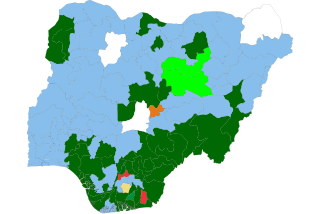
The table below shows the list of Nigerian senators of the 9th National Assembly. The Senate includes three senators from each of the 36 states, plus one senator for the Federal Capital Territory. The Senate president is the head of the house, and assisted by the deputy Senate president. The Senate president and his deputy also work with the principal officers in the house including the majority leader, deputy majority leader, minority leader, deputy minority leader, chief whip, deputy chief whip, minority whip and deputy minority whip.

The 2023 Nigerian gubernatorial elections were held for state governors in 31 out of 36 Nigerian states. All but three elections were held on 18 March—concurrent with elections to every state house of assembly, three weeks after the presidential election and National Assembly elections—while the Imo State, Kogi State, and Bayelsa State elections will be held on 11 November. The last regular gubernatorial elections for all states were in 2019. All states have a two term limit for Governors which makes 18 incumbent governors ineligible for re-election.

The 2023 Bauchi State gubernatorial election took place on 18 March 2023, to elect the Governor of Bauchi State, concurrent with elections to the Bauchi State House of Assembly as well as twenty-seven other gubernatorial elections and elections to all other state houses of assembly. The election—which was postponed from its original 11 March date—was held three weeks after the presidential election and National Assembly elections. Incumbent PDP Governor Bala Mohammed initially declined to run for re-election, instead running for president. However, after losing the PDP presidential primary in May 2022, Mohammed was renominated in a rerun primary. Mohammed was re-elected as governor by a 9% margin over first runner-up and APC nominee — former Chief of the Air Staff Sadique Abubakar.

The 2023 Gombe State gubernatorial election was held on 18 March 2023, to elect the Governor of Gombe State, concurrent with elections to the Gombe State House of Assembly as well as twenty-seven other gubernatorial elections and elections to all other state houses of assembly. The election — which was postponed from its original 11 March date — was held three weeks after the presidential election and National Assembly elections. Incumbent APC Governor Muhammad Inuwa Yahaya was re-elected by a margin of 18% over PDP nominee, businessman Mohammed Jibrin Barde.
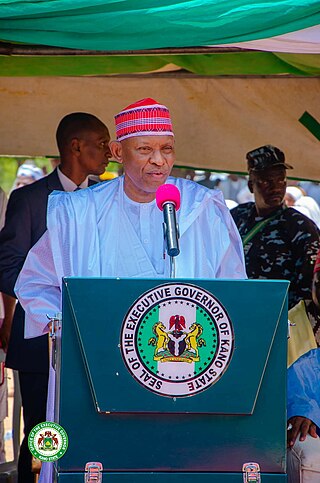
The 2023 Kano State gubernatorial election took place on 18 March 2023, to elect the Governor of Kano State, concurrent with elections to the Kano State House of Assembly as well as twenty-seven other gubernatorial elections and elections to all other state houses of assembly. The election, which was postponed from its original 11 March date, was held three weeks after the presidential election and National Assembly elections. Incumbent APC Governor Abdullahi Umar Ganduje was term-limited and could not seek re-election to a third term. Abba Kabir Yusuf — a former commissioner and son-in-law of former Governor Rabiu Musa Kwankwaso — gained the office for the NNPP by a 6.5% margin over Deputy Governor Nasir Yusuf Gawuna, the APC nominee.

The 2023 Kwara State gubernatorial election was held on 18 March 2023, to elect the incumbent Governor of Kwara State, concurrent with elections to the Kwara State House of Assembly as well as twenty-seven other gubernatorial elections and elections to all other state houses of assembly. The election — which was postponed from its original 11 March date — was held three weeks after the presidential election and National Assembly elections. Incumbent AbdulRahman AbdulRazaq (APC) was re-elected by a 25.6% margin over PDP nominee Shuaib Yaman Abdullahi.

The 2023 Zamfara State gubernatorial election was held on 18 March 2023, to elect the Governor of Zamfara State, concurrent with elections to the Zamfara State House of Assembly as well as twenty-seven other gubernatorial elections and elections to all other state houses of assembly. The election — which was postponed from its original 11 March date — was held three weeks after the presidential election and National Assembly elections. Incumbent All Progressives Congress Governor Bello Matawalle was eligible for re-election but defeated by banker Dauda Lawal — the nominee of the Peoples Democratic Party.

The 2019 Nigerian Senate election were held in all 109 senatorial districts where voters elected senators using first-past-the-post voting. Most elections were held on February 23, 2019, with some elections running into February 24 while others had supplementary or rerun elections that took place at a later date. The last regular senatorial elections for all districts were in 2015.
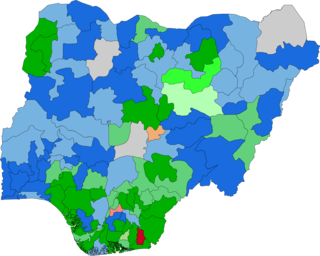
The 2023 Nigerian Senate elections were held on 25 February 2023 in all 109 senatorial districts where voters elected senators using first-past-the-post voting. The last regular senatorial elections for all districts were in 2019.
The 2023 Nigerian House of Representatives elections were held on 25 February 2023 where voters elected members of the House of Representatives using first-past-the-post voting in all 360 federal constituencies. The last regular House elections for all districts were in 2019.

The 2019 Nigerian House of Representatives election was held in all 360 constituencies where voters elected members of the House of Representatives using first-past-the-post voting. Most elections were held on February 23, 2019 with some elections running into February 24 while others had supplementary or rerun elections that took place at a later date. The last regular House elections for all districts were in 2015.
The 2022 Nigerian state legislative elections are called to fill vacant seats in state Houses of Assembly.
Elections were held throughout Nigeria throughout 2022. During the year, the governors of Ekiti and Osun states were elected on 18 June and 16 July, respectively. Additionally, there were also elections to fill vacant seats in the House of Representatives and state houses of assembly along with local elections in Adamawa State, Benue State, Edo State, Enugu State, the Federal Capital Territory, Imo State, Katsina State, and Kebbi State.
The 2023 Adamawa State House of Assembly election was take place on 18 March 2023, to elect members of the Adamawa State House of Assembly. The election was held concurrent with the state gubernatorial election as well as twenty-seven other gubernatorial elections and elections to all other state houses of assembly. It was held two weeks after the presidential election and National Assembly elections.
The 2023 Akwa Ibom State House of Assembly election took place on 11 March 2023, to elect members of the Akwa Ibom State House of Assembly. The election was held concurrent with the state gubernatorial election as well as twenty-seven other gubernatorial elections and elections to all other state houses of assembly. It was held three weeks after the presidential election and National Assembly elections.
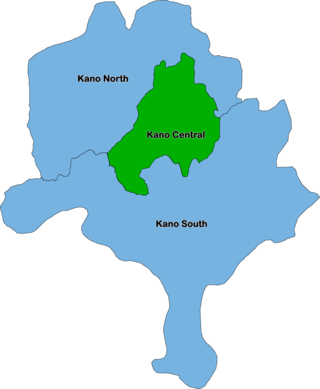
The 2023 Nigerian Senate elections in Kano State will be held on 25 February 2023, to elect the 3 federal Senators from Kano State, one from each of the state's three senatorial districts. The elections will coincide with the 2023 presidential election, as well as other elections to the Senate and elections to the House of Representatives; with state elections being held two weeks later. Primaries were held between 4 April and 9 June 2022.













